Special
UN celebrates 64 years
 October 24, 2009: October 24, 2009:
The United Nations (UN) was founded in 1945 after World War II to
replace the League of Nations, to stop wars between countries and to
provide a platform for dialogue. It contains multiple subsidiary
organizations to carry out its missions.
The United Nations (UN) is an international organization whose stated
aims are facilitating cooperation in international law, international
security, economic development, social progress, human rights, and the
achieving of world peace.
There are currently 192 member states, including nearly every
sovereign state in the world. From its offices around the world, the UN
and its specialized agencies decide on substantive and administrative
issues in regular meetings held throughout the year.
The organization is divided into administrative bodies, primarily:
the General Assembly (the main deliberative assembly), the Security
Council (decides certain resolutions for peace and security), the
Economic and Social Council (assists in promoting international economic
and social cooperation and development), the Secretariat (provides
studies, information, and facilities needed by the UN) and the
International Court of Justice (the primary judicial organ). Additional
bodies deal with the governance of all other UN System agencies, such as
the World Health Organization (WHO), the World Food Program (WFP) and
United Nations Children's Fund (UNICEF).
|
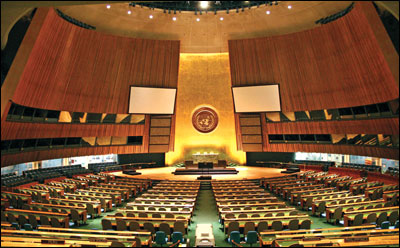
The General Assembly Hall |
The UN's most visible public figure is the Secretary-General,
currently Ban Ki-moon of South Korea, who attained the post in 2007.
The organization is financed from assessed and voluntary
contributions from its member states, and has six official languages:
Arabic, Chinese, English, French, Russian, and Spanish.
History
The United Nations was established in 1945 to maintain international
peace and promote cooperation in solving international economic, social
and humanitarian problems following the wake of the failed League of
Nations. The earliest concrete plan for a new world organization was
begun under the aegis of the US State Department in 1939.
Franklin D. Roosevelt first coined the term 'United Nations', as a
term to describe the Allied countries.
The term was first officially used on January 1, 1942 when 26
Governments signed the Atlantic Charter, pledging to continue the war
effort. On 25 April 1945, the UN Conference on International
Organization began in San Francisco, attended by 50 Governments and a
number of non-governmental organizations involved in drafting the
Charter of the United Nations.
The UN officially came into existence on October 24, 1945 upon
ratification of the Charter by the five permanent members of the
Security Council, France, the Republic of China, the Soviet Union, the
United Kingdom and the United States and by a majority of the other 46
signatories.
The first meetings of the General Assembly, with 51 nations
represented, and the Security Council, took place in Westminster Central
Hall in London in January 1946.
|
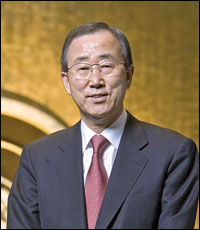
Current UN Secretary-General Ban Ki-Moon |
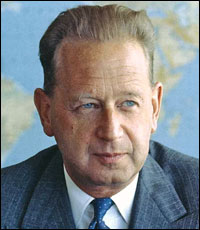
Dag Hammarskjöld |
|
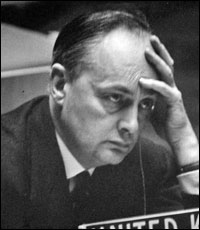
Sir Gladwyn Jebb |
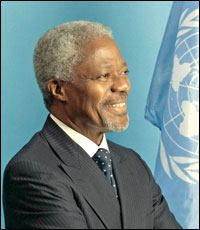
Kofi Annan |
The General Assembly is the main deliberative assembly of the United
Nations. Composed of all United Nations member states, the assembly
meets in regular yearly sessions under a president elected from
 among
the member states. Over a two-week period at the start of each session,
all members have the opportunity to address the assembly. Traditionally,
the Secretary-General makes the first statement, followed by the
president of the assembly. among
the member states. Over a two-week period at the start of each session,
all members have the opportunity to address the assembly. Traditionally,
the Secretary-General makes the first statement, followed by the
president of the assembly.
The first session was convened on 10 January 1946 in the Westminster
Central Hall in London and included representatives of 51 nations.
When the General Assembly votes on important questions, a two-thirds
majority of those present and voting is required. Examples of important
questions include: recommendations on peace and security; election of
members to organs; admission, suspension, and expulsion of members; and,
budgetary matters. All other questions are decided by majority vote.
Each member country has one vote. Apart from approval of budgetary
matters, resolutions are not binding on the members.
The Assembly may make recommendations on any matters within the scope
of the UN, except matters of peace and security that are under Security
Council consideration.
Conceivably, the one state, one vote power structure could enable
states.
However, as no more than recommendations, it is difficult to imagine
a situation in which a recommendation by member states constituting just
eight percent of the world's population, would be adhered to by the
remaining ninety-two percent of the population, should they object.
Promoting peace and development :
Sports to play major role in UN efforts
Gu Zhenqiu
Sports can play a major role in the UN efforts to promote peace and
development in the world, and the UN family can use sports as a new tool
to develop cooperation and attain the UN Millennium Development Goals, a
top UN sports official said here on Tuesday.
Wilfried Lemke, the UN under-secretary-general, told a group of
UN-based correspondents that he is trying to bring peace to the Middle
East with soccer games, which are very popular in the world. Lemke, who
is also special adviser to the UN Secretary-general on sport for
development and peace, said he was welcomed by both Israelis and
Palestinians when he visited the Middle East.
On his first day to work for the UN, UN Secretary-general Ban Ki-moon
told him: "Do not forget Africa. Africa must be one of the top
priorities".
"Sports has a crucial role to play in the efforts of the United
Nations to improve the lives of people around the world", said Lemke.
"Sports builds bridges between individuals and across communities,
providing a fertile ground for sowing the seeds of development and
peace". In March 2008, Ban appointed Lemke as his special adviser on
sport for development and peace, with the aim of further reaching out to
the world of sport and more systematically and coherently encouraging
the use of sport as a means to promote development and peace.
Lemke succeeded Adolf Ogi, former president of the Swiss
Confederation, who had served as UN special advisor since 2001.
"Let's see how the UN family can do to use sports as a new tool to
achieve the Millennium Development Goals", he said. On his post, Lemke
acts as representative, advocate and facilitator for the United Nations.
He represents the Secretary-general and the United Nations system at
important global sports events and other strategically important fora.
He leads and coordinates the efforts of the UN system to promote
understanding and support amongst UN member states and other actors for
sport as a tool to attain the Millennium Development Goals, with a
special focus on sport's contribution to poverty eradication.
He also encourages dialogue, collaboration and partnerships around
sport for development and peace between the United Nations and member
states, international sports organizations, civil society, the private
sector and the media. The UN General Assembly on Monday adopted
resolutions, tabled by the governments of Canada and South Africa, on
Olympic Truce and FIFA World Cup respectively, and the first Youth
Olympic Games in Singapore.
"I have a small office in Geneva, with five staff, and a liaison
office here in New York, with two staff", Lemke said. "We are not
financed by the UN system, we are supported by certain countries",
including his home country Germany, said Lemke, adding 'I am only paid
one (US) dollar' by the United Nations. Lemke has over 25 years of
professional experience in both sports and politics. From 1999 to 2008,
he served as senator of the Interior and Sport as well as Senator for
Education and Science of the State of Bremen, Germany.
He was manager for 18 years of Werder Bremen, one of the top football
clubs in Europe. In this capacity, he notably engaged in fundraising and
the initiation of relief projects in Eastern Europe and the Commonwealth
of Independent States.
Throughout his career, he has been a dedicated advocate for the
importance of sport in education and society. Xinhua
*******
The countries that rectified the UN Charter and the five founder
countries are:
Argentina,
Australia,
Belgium,
Brazil,
Byelorussia,
Canada,
Chile,
Columbia,
Cuba,
Czechoslovakia,
Denmark,
Dominican Republic,
Egypt,
El Salvador,
Haiti,
Iran,
Lebanon,
Luxembourg,
New Zealand,
Nicaragua,
Paraguay,
Philippines,
Poland,
Saudi Arabia,
South Africa,
Syriya,
Turkey,
Yugoslavia, and
Ukraine, India, Netherlands and Norway signed the Charter in November
the same year and became members of the UNO.
Sri Lanka became a member of the UNO on December 14, 1955, 7 years
after it gained independence from the British Empire. Japan got
membership only an year after Sri Lanka, in December 1956 and Germany in
September 1973.
In 1949 the People's Republic of China became a member of the
Security Council replacing China
(Taiwan).
As per the Charter the organization comprised six main organs:
01. General Assembly,
02. Security Council,
03. Economic and Social Council,
04. International Court of Justice,
05. Trusteeship Council,
06. Secretariat,
The Charter named the five founder countries:
1. UK, Britain,
2. USSR
3. USA
4. France
5. China
They were the original Security Council members with Veto power. -
Walter Wijenayake
Previous Secretary Generals of the UN
The Secretary General of the United Nations is the most important
position within the UN. Secretary Generals have used their positions to
speak out on global issues. They have often been seen as offering a
leader and mediator.
Because of the importance of the job, candidates tend to be chosen
who are not controversial and not particularly famous.
Sir Gladwyn Jebb (United Kingdom), acting,
1945 - 1946.
Trygve Lie (Norway), 1946 - 1952.
Dag Hammarskjöld (Sweden), 1953 - 1961.
U Thant (Burma), 1961 - 1971.
Kurt Waldheim (Austria), 1972 - 1981.
Javier Pérez de Cuéllar (Peru), 1982 - 1991
Boutros Boutros-Ghali (Egypt), 1992 - 1996.
Kofi Annan (Ghana), 1997 to present. |



